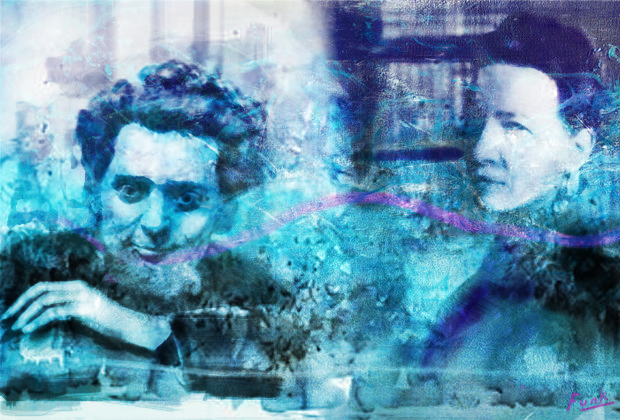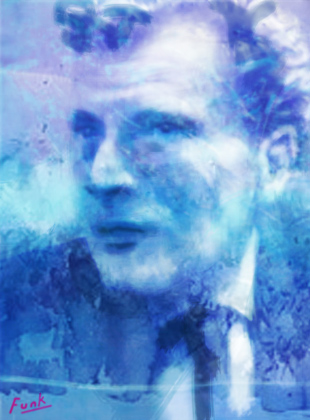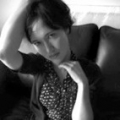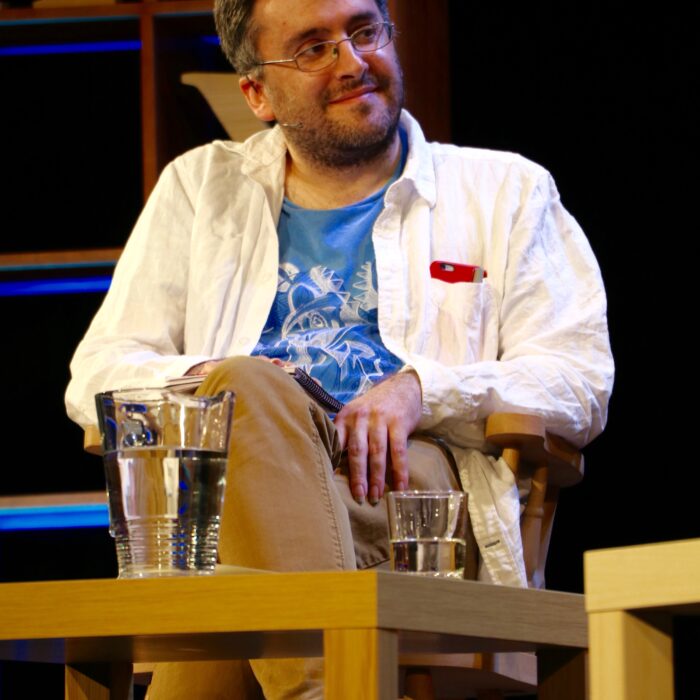You have no items in your cart. Want to get some nice things?
Go shopping
So many articles have been published in recent years decrying of the end of the bookstore, the end of printed books. It’s true, thousands of bookshops have shut their doors, but in Paris the independent bookstore is very much alive. You can’t cross the street in the 5th and 6th arrondissements without passing a bookstore. And unlike the Anglophone market, which is dominated by big chains, in France there is a healthy balance of large publishers and smaller specialist presses which have their own bookshops and loyal clientele. For decades, Le Nouvel Athanor, a publisher specialising in poetry, has operated out of the Galerie Librarie Racine. I sat down with editor Jean-Luc Maxence to discuss gender, Jung, Simone de Beauvoir, and why he feels we can celebrate the differences between the sexes, but not entirely eliminate them.

Litro: It’s amazing that gender studies and feminism are still such charged topics.
Jean-Luc Maxence: That’s a subject we’ll be treating in my new magazine Rebelle(s) in the second or third volume – because the spirit of the magazine is not to deal with everything that’s in the news at the moment. So we’ll talk about gender, desire, sexuality, etc, but we don’t discuss exclusively things going on right now. We try to keep a certain distance from what’s happening to maintain our philosophical reflections, without being reactionaries, without following everything that’s fashionable.
Without doubt, all the debates around gender are useful because they empower women as well as men. It forces us to question the difference between men and women, their differing mentalities, and what Jung called animus (the masculine) and anima (the feminine).
Litro: Apart from being an editor and writer, you are also a Jungian psychoanalyst.
Jean-Luc Maxence: Yes, I’m a Jungian. And for Jung, there is in a woman, one part man. And in a man, one part woman. And one cannot say that the woman who is part man is a lesbian, and the man who is part woman is homosexual. It’s not that at all. It’s the idea that in each of us there is a temperament that veers towards anima, in it’s sacred sense, and another that veers towards animus. And it’s the harmony between the two which creates the person.
So, of course there are sexual differences because the pretext of the word gender is that everything is mixed. Everyone is hermaphrodite – that’s completely false, idiotic. Maybe that idea worked in the tenth century. Not today. Today that’s a view of the world which is completely false…It’s just one point of view, not all of society. For artists and poets, that kind of fluidity is important, but we shouldn’t make that the obligatory explanation of the world.
Litro: There is in France the Oulipo movement, which approaches literature from a scientific and mathematic point of view. Anne Garréta wrote Sphinx, a book which completely eliminated gender, in which the reader is left completely at a loss as to the sex of the characters: all the external signs have been scrubbed away…
Jean-Luc Maxence: For me that’s an artifice. You can’t do it. It’s not possible. It’s a game – that’s useful, that’s amusing – but one cannot. Not because women haven’t been exploited by Occidental society, that I don’t deny. It’s true. It’s because where a man becomes a woman and woman a man, is fortunately not possible – I mean in terms of literature, it’s ultimately useless. There remains a mystery, even unto itself, that makes sexless writing impossible.
There exists in the world the idea that we can reinvent ourselves tomorrow, begin again as something else. Sexuality is the mystery of women and of men. We cannot, under the pretext of our dreams, of liberty, of anarchy, say that everyone is the same and there is no gender. That’s really idiotic and not honest.
Litro: We should accept our differences. Because a novel where characters are neither women or men is no longer about people. It’s a novel of objects.
Jean-Luc Maxence: Yes, and it’s also false because there are objects which are profoundly feminine. And those which are profoundly masculine.
Litro: In English we don’t have this conception.
Jean-Luc Maxence: And maybe that’s unfortunate. It’s true that in the English language, which I don’t know very well, it doesn’t have that aspect which the French language has, where we can talk of the feminine and the masculine spelling of a word. It’s not always easy, but it’s interesting. And for me that kind of literature that seeks to eliminate, it’s a little like a chess game, a crossword puzzle. I knew Georges Perec very well. [Perec was an Oulipian]. He wrote for my literary journal Présence et Regards. I devoted a special issue to him when he wasn’t yet well-known. Georges would have never said there is neither woman or man, that there is no longer inequality. That’s an absurd idea.
Litro: And could we talk about Rebelle(s). Who do you consider France’s great female rebels?
Jean-Luc Maxence: Louise Labé or even Simone de Beauvoir, despite everything. Perhaps from today’s viewpoint, she’s a little characterised, seen almost like a man.
Litro: Paradoxically.
Jean-Luc Maxence: Yes, paradoxically. Simone de Beauvoir is seen a little like a man and today there are ‘relationship specialists’ who claim that she was the man and Sartre was the woman. It’s amusing.
Litro: A philosopher friend of mind said that she was a drageuse for him. Well, he used a less diplomatic word. He said, in not so many words, that she was Sartre’s personal pimp – got him young women.
Jean-Luc Maxence: Yes, of course! More or less. Completely. Because to begin with, he was rather ugly, the poor guy. I don’t know, on the level of sensibility, Sartre was not a Hercules or a great seducer. No, it was his intelligence, not his heart, anyway. When one rereads The Second Sex, which is an interesting book, we are astonished – how can you live in a couple like that with Sartre? It’s terrible. She was really a rebel, but she was ‘a man’ or part man in her private life. It’s something to study, and now we have a chance with hindsight. It’s been fifty years. We couldn’t do it at the time. It was sad, that. And so the great female rebels in France, they were often sad figures. Who were they? Christiane Rochefort? (he makes a face) It was horrible. Albertine Sarrazin? I don’t know if you’ve read her. It was very, very hard for her. (After being put into foster care at a young age, Sarrazin went to reform school and later engaged in prostitution and crime and spent most of her life in and out of prisons, where she began writing novels.) Now we have hindsight. We have only their ideas. De Beauvoir is more moving when you read her now. If you read the correspondence between the Castor (that’s Sartre) and her, it’s very interesting.
(translated from the French by Mia Funk)
Jean-Luc Maxence is a poet, writer and editor. In France, he directs a national association for the prevention of addiction, and is the President of the French delegation of the European Association of Psychoanalysis. He founded the literary journals Présence et Regards et Les Cahiers du Sens, and this October he is launching the magazine Rebelle(s).

About Mia Funk
Mia Funk, Mia has received many awards & nominations, including a Prix de Peinture (Salon d’Automne de Paris), Thames & Hudson Pictureworks Prize, Sky Arts Portrait Artist of the Year, KWS Hilary Mantel Short Story Prize, Doris Gooderson Prize, Aesthetica Magazine's Creative Works, Momaya Prize & Celeste Prize. Her paintings have been featured on radio and television, at group shows at the Grand Palais, and are held in several public collections, including the Dublin Writers Museum. She is currently working on portraits for the American Writers Museum, completing a novel and a collection of linked short stories.



